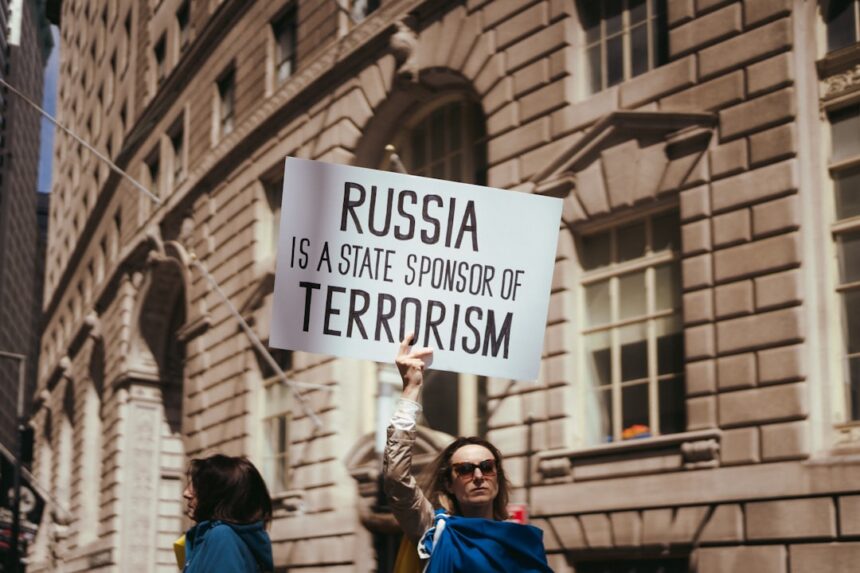The history of U.S. foreign policy propaganda is a complex narrative that has evolved significantly over the decades. From the early days of the Republic, American leaders recognized the power of persuasion in shaping public opinion and garnering support for foreign initiatives.
During the 19th century, the U.S. government began to employ propaganda as a tool to promote its expansionist agenda, particularly in relation to Manifest Destiny. This ideology not only justified territorial acquisitions but also framed them as a moral imperative, suggesting that it was the nation’s duty to spread democracy and civilization across the continent.
As the 20th century unfolded, the role of propaganda in U.S. foreign policy became even more pronounced, particularly during World War I and World War
The Committee on Public Information, established during World War I, marked a significant turning point in the use of propaganda. This government agency was tasked with influencing public opinion in favor of the war effort through various media channels, including posters, films, and pamphlets. The success of these efforts laid the groundwork for future propaganda campaigns, as the U.S.
government recognized the importance of controlling narratives to achieve its foreign policy objectives.
Key Takeaways
- US foreign policy propaganda has a long history, dating back to the early 20th century and evolving through various conflicts and geopolitical shifts.
- Propaganda plays a significant role in shaping international relations, influencing public opinion, and garnering support for policy objectives.
- The use of media, including traditional outlets and digital platforms, is a key tool in US foreign policy propaganda efforts.
- US foreign policy propaganda has a significant impact on global perceptions of the country, its leaders, and its policies.
- The ethical implications of US foreign policy propaganda raise questions about truth, transparency, and the manipulation of public opinion for political gain.
The Role of Propaganda in Influencing International Relations

Propaganda plays a crucial role in shaping international relations by framing narratives that influence how countries perceive one another. Through carefully crafted messages, governments can promote their interests, justify military interventions, or rally support for diplomatic initiatives. In many cases, propaganda serves to create a favorable image of a nation while demonizing its adversaries.
This strategic communication can significantly impact bilateral relations, as countries often respond to the narratives presented by their counterparts. Moreover, propaganda can also serve as a tool for soft power, allowing nations to project their values and ideals onto the global stage. By promoting concepts such as democracy, human rights, and freedom, the U.S.
has sought to position itself as a moral leader in international affairs. This approach not only aims to win hearts and minds abroad but also seeks to establish a framework for international norms that align with American interests. However, the effectiveness of such propaganda can vary depending on the context and the receptiveness of foreign audiences.
The Use of Media in US Foreign Policy Propaganda
| Media Type | Usage in Propaganda |
|---|---|
| Television | Used to broadcast messages to a wide audience |
| Radio | Utilized for spreading propaganda in remote areas |
| Internet | Platforms used for spreading misinformation and influencing public opinion |
| Newspapers | Print media used to publish propaganda articles and stories |
| Social Media | Used to target specific demographics and spread propaganda messages |
The media has long been an essential instrument in the dissemination of U.S. foreign policy propaganda. From traditional print media to modern digital platforms, various channels have been utilized to communicate messages that align with national interests.
In the mid-20th century, television emerged as a powerful medium for shaping public perceptions of foreign policy. Iconic broadcasts during events such as the Vietnam War illustrated how media coverage could sway public opinion and influence policy decisions. In recent years, social media has transformed the landscape of propaganda dissemination.
Platforms like Twitter and Facebook allow for rapid information sharing and engagement with global audiences. The U.S. government has adapted to this shift by employing digital strategies to promote its foreign policy objectives.
However, this evolution also presents challenges, as misinformation and competing narratives can easily spread across these platforms, complicating efforts to control the narrative.
The Impact of US Foreign Policy Propaganda on Global Perceptions
The impact of U.S. foreign policy propaganda on global perceptions cannot be overstated. Through strategic messaging, the U.S. has been able to shape how other nations view its actions and intentions. For instance, during the Cold War, American propaganda emphasized the threat posed by communism while portraying the U.S. as a bastion of freedom and democracy. This narrative not only justified military interventions but also helped to solidify alliances with countries that shared similar values. However, the effectiveness of this propaganda is often contingent upon the credibility of the source and the historical context in which it is presented. In recent years, skepticism towards U.S. motives has grown in various parts of the world, leading to a more nuanced understanding of American foreign policy actions. As global audiences become increasingly aware of the complexities behind U.S. interventions and alliances, the simplistic narratives often employed in propaganda may no longer resonate as they once did.
The Ethical Implications of US Foreign Policy Propaganda

The ethical implications surrounding U.S. foreign policy propaganda are profound and multifaceted. On one hand, governments have a responsibility to inform their citizens about international affairs and justify their actions abroad.
However, when propaganda veers into manipulation or misinformation, it raises serious ethical concerns about transparency and accountability. The line between persuasion and deception can often become blurred, leading to public distrust and cynicism. Furthermore, the use of propaganda can have significant consequences for global stability and peace.
When narratives are constructed to vilify other nations or justify military action without adequate evidence, they can exacerbate tensions and contribute to conflict escalation. Ethical considerations must therefore be at the forefront of any discussion regarding U.S. foreign policy propaganda, as leaders must weigh the potential benefits against the moral implications of their messaging strategies.
The Effectiveness of US Foreign Policy Propaganda in Achieving Policy Goals
The effectiveness of U.S. foreign policy propaganda in achieving its goals is a subject of ongoing debate among scholars and policymakers alike. While there are instances where propaganda has successfully garnered public support for military interventions or diplomatic initiatives, there are also notable failures that highlight its limitations.
For example, despite extensive propaganda efforts during the Iraq War to justify military action based on claims of weapons of mass destruction, public trust eroded when those claims were proven false. Moreover, the effectiveness of propaganda is often contingent upon external factors such as geopolitical dynamics and domestic political landscapes. In an increasingly polarized environment, messages that resonate with one segment of the population may alienate others, complicating efforts to build consensus around foreign policy initiatives.
As such, while propaganda remains a vital tool in shaping perceptions and garnering support, its success is not guaranteed.
The Relationship Between US Foreign Policy Propaganda and Public Opinion
The relationship between U.S. foreign policy propaganda and public opinion is intricate and reciprocal. On one hand, effective propaganda can shape public perceptions and attitudes toward foreign policy issues, influencing how citizens respond to government actions abroad.
Conversely, public opinion can also shape the narratives that emerge from government propaganda efforts; leaders often tailor their messages based on prevailing sentiments among their constituents. In recent years, social media has amplified this dynamic by providing platforms for public discourse and dissenting voices. Citizens can now engage directly with policymakers and challenge official narratives in real time.
This shift has made it increasingly difficult for governments to control public opinion solely through traditional propaganda methods. As a result, U.S. foreign policy messaging must now navigate a more complex landscape where public sentiment plays a crucial role in shaping both domestic and international perceptions.
The Influence of US Foreign Policy Propaganda on International Alliances
U.S. foreign policy propaganda has historically played a significant role in shaping international alliances and partnerships. By promoting shared values such as democracy and human rights, the U.S.
has sought to forge alliances with countries that align with its ideological framework. This approach not only strengthens bilateral relations but also creates a network of like-minded nations that can collectively address global challenges. However, the effectiveness of this strategy is often contingent upon how well these narratives resonate with foreign audiences.
In some cases, countries may be hesitant to align themselves too closely with U.S. interests if they perceive American actions as hypocritical or self-serving. As global power dynamics shift and new alliances emerge, U.S.
foreign policy propaganda must adapt to maintain relevance and foster cooperation among diverse nations.
The Evolution of US Foreign Policy Propaganda in the Digital Age
The digital age has ushered in a new era for U.S. foreign policy propaganda, characterized by rapid information dissemination and increased interactivity with global audiences.
This evolution has allowed for more nuanced storytelling and real-time responses to emerging events. However, this shift also presents challenges related to misinformation and competing narratives that can undermine official messaging efforts. The proliferation of alternative media sources means that governments must contend with a diverse array of voices that may challenge or contradict their narratives.
S. foreign policy propaganda must evolve continuously to remain effective in an increasingly fragmented information landscape.
The Challenges and Criticisms of US Foreign Policy Propaganda
U.S. foreign policy propaganda faces numerous challenges and criticisms that complicate its effectiveness and ethical standing. One significant challenge is the growing skepticism among both domestic and international audiences regarding government narratives.
In an era marked by misinformation and distrust in institutions, citizens are more likely to question official accounts of events or motives behind foreign policy decisions. Additionally, critics argue that U.S. propaganda often oversimplifies complex geopolitical issues or fails to acknowledge historical contexts that shape current events.
This reductionist approach can lead to misunderstandings and reinforce negative stereotypes about other nations or cultures. As such, addressing these criticisms requires a commitment to transparency and a willingness to engage in more nuanced discussions about foreign policy objectives.
The Future of US Foreign Policy Propaganda in a Changing Global Landscape
As global dynamics continue to evolve rapidly, the future of U.S. foreign policy propaganda will likely be shaped by several key factors. The rise of multipolarity in international relations means that traditional narratives may no longer hold sway over diverse audiences worldwide.
To remain relevant, U.S. propaganda must adapt by embracing more inclusive messaging that acknowledges varying perspectives and experiences. Furthermore, advancements in technology will continue to influence how information is disseminated and consumed globally.
Governments will need to navigate an increasingly complex digital landscape where misinformation can spread rapidly alongside official narratives. As such, fostering media literacy among citizens will be essential for ensuring informed public discourse around foreign policy issues. In conclusion, U.S.
foreign policy propaganda has played a pivotal role throughout history in shaping international relations and influencing public opinion both domestically and abroad. While it remains an essential tool for achieving policy goals, its effectiveness is contingent upon ethical considerations and an understanding of evolving global dynamics.
In recent years, the intricacies of U.S. foreign policy have often been intertwined with the strategic use of propaganda to shape international perceptions and domestic support. An insightful article that delves into this topic can be found on the website “In The War Room.” This piece explores how propaganda is not just a tool of war but a nuanced instrument of diplomacy and influence. For a deeper understanding of how these strategies are employed and their implications on global politics, you can read more in the article available at In The War Room.
CHECK THIS OUT! 📽️🎞️ Hollywood’s Secret War: How the CIA Rewrote Movies
FAQs
What is US foreign policy propaganda?
US foreign policy propaganda refers to the dissemination of information, ideas, or rumors to influence the opinions or actions of people in other countries in support of the United States’ foreign policy objectives.
How does the US government use propaganda in its foreign policy?
The US government uses propaganda in its foreign policy through various means, including public diplomacy, media campaigns, cultural exchanges, and information operations to shape perceptions and influence the behavior of foreign audiences.
Is US foreign policy propaganda legal?
The use of propaganda by the US government in its foreign policy is legal under US law. However, there are regulations and guidelines in place to ensure that the dissemination of information is truthful and in line with the country’s strategic interests.
What are some examples of US foreign policy propaganda?
Examples of US foreign policy propaganda include efforts to promote democracy, human rights, and freedom of the press in other countries, as well as campaigns to counter extremist ideologies and influence public opinion in support of US policies.
How does US foreign policy propaganda impact international relations?
US foreign policy propaganda can impact international relations by shaping perceptions of the United States, influencing public opinion in other countries, and affecting the willingness of foreign governments to cooperate with the US on various issues.




